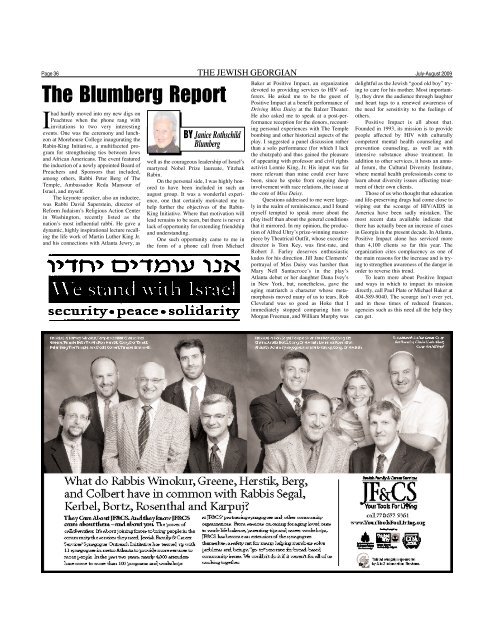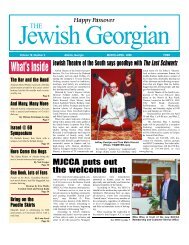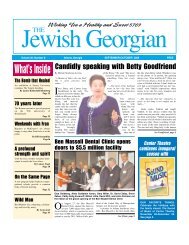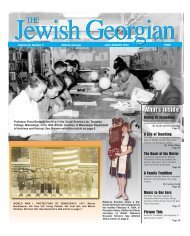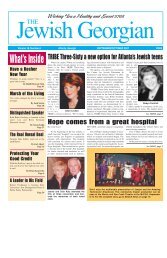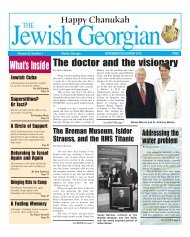JGA July-August 09 - The Jewish Georgian
JGA July-August 09 - The Jewish Georgian
JGA July-August 09 - The Jewish Georgian
You also want an ePaper? Increase the reach of your titles
YUMPU automatically turns print PDFs into web optimized ePapers that Google loves.
Page 36 THE JEWISH GEORGIAN <strong>July</strong>-<strong>August</strong> 20<strong>09</strong><br />
<strong>The</strong> Blumberg Report<br />
I<br />
had hardly moved into my new digs on<br />
Peachtree when the phone rang with<br />
invitations to two very interesting<br />
events. One was the ceremony and luncheon<br />
at Morehouse College inaugurating the<br />
Rabin-King Initiative, a multifaceted program<br />
for strengthening ties between Jews<br />
and African Americans. <strong>The</strong> event featured<br />
the induction of a newly appointed Board of<br />
Preachers and Sponsors that included,<br />
among others, Rabbi Peter Berg of <strong>The</strong><br />
Temple, Ambassador Reda Mansour of<br />
Israel, and myself.<br />
<strong>The</strong> keynote speaker, also an inductee,<br />
was Rabbi David Saperstein, director of<br />
Reform Judaism’s Religious Action Center<br />
in Washington, recently listed as the<br />
nation’s most influential rabbi. He gave a<br />
dynamic, highly inspirational lecture recalling<br />
the life work of Martin Luther King Jr.<br />
and his connections with Atlanta Jewry, as<br />
BY<br />
Janice Rothschild<br />
Blumberg<br />
well as the courageous leadership of Israel’s<br />
martyred Nobel Prize laureate, Yitzhak<br />
Rabin.<br />
On the personal side, I was highly honored<br />
to have been included in such an<br />
august group. It was a wonderful experience,<br />
one that certainly motivated me to<br />
help further the objectives of the Rabin-<br />
King Initiative. Where that motivation will<br />
lead remains to be seen, but there is never a<br />
lack of opportunity for extending friendship<br />
and understanding.<br />
One such opportunity came to me in<br />
the form of a phone call from Michael<br />
Baker at Positive Impact, an organization<br />
devoted to providing services to HIV sufferers.<br />
He asked me to be the guest of<br />
Positive Impact at a benefit performance of<br />
Driving Miss Daisy at the Balzer <strong>The</strong>ater.<br />
He also asked me to speak at a post-performance<br />
reception for the donors, recounting<br />
personal experiences with <strong>The</strong> Temple<br />
bombing and other historical aspects of the<br />
play. I suggested a panel discussion rather<br />
than a solo performance (for which I lack<br />
the chutzpah) and thus gained the pleasure<br />
of appearing with professor and civil rights<br />
activist Lonnie King, Jr. His input was far<br />
more relevant than mine could ever have<br />
been, since he spoke from ongoing deep<br />
involvement with race relations, the issue at<br />
the core of Miss Daisy.<br />
Questions addressed to me were largely<br />
in the realm of reminiscence, and I found<br />
myself tempted to speak more about the<br />
play itself than about the general conditions<br />
that it mirrored. In my opinion, the production<br />
of Alfred Uhry’s prize-winning masterpiece<br />
by <strong>The</strong>atrical Outfit, whose executive<br />
director is Tom Key, was first-rate, and<br />
Robert J. Farley deserves enthusiastic<br />
kudos for his direction. Jill Jane Clements’<br />
portrayal of Miss Daisy was harsher than<br />
Mary Nell Santacroce’s in the play’s<br />
Atlanta debut or her daughter Dana Ivey’s<br />
in New York, but, nonetheless, gave the<br />
aging matriarch a character whose metamorphosis<br />
moved many of us to tears. Rob<br />
Cleveland was so good as Hoke that I<br />
immediately stopped comparing him to<br />
Morgan Freeman, and William Murphy was<br />
delightful as the <strong>Jewish</strong> “good old boy” trying<br />
to care for his mother. Most importantly,<br />
they drew the audience through laughter<br />
and heart tugs to a renewed awareness of<br />
the need for sensitivity to the feelings of<br />
others.<br />
Positive Impact is all about that.<br />
Founded in 1993, its mission is to provide<br />
people affected by HIV with culturally<br />
competent mental health counseling and<br />
prevention counseling, as well as with<br />
intensive substance abuse treatment. In<br />
addition to other services, it hosts an annual<br />
forum, the Cultural Diversity Institute,<br />
where mental health professionals come to<br />
learn about diversity issues affecting treatment<br />
of their own clients.<br />
Those of us who thought that education<br />
and life-preserving drugs had come close to<br />
wiping out the scourge of HIV/AIDS in<br />
America have been sadly mistaken. <strong>The</strong><br />
most recent data available indicate that<br />
there has actually been an increase of cases<br />
in Georgia in the present decade. In Atlanta,<br />
Positive Impact alone has serviced more<br />
than 4,100 clients so far this year. <strong>The</strong><br />
organization cites complacency as one of<br />
the main reasons for the increase and is trying<br />
to strengthen awareness of the danger in<br />
order to reverse this trend.<br />
To learn more about Positive Impact<br />
and ways in which to impact its mission<br />
directly, call Paul Plate or Michael Baker at<br />
404-589-9040. <strong>The</strong> scourge isn’t over yet,<br />
and in these times of reduced finances,<br />
agencies such as this need all the help they<br />
can get.


